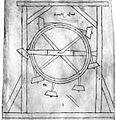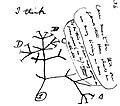Diagrams by period
This article gives an overview of diagrams by period of origin.
Medieval diagrams[edit]
- See main article Medieval diagrams and Category:Medieval diagrams
Medieval astronomy[edit]
-
Planetary Movements
10th century -
Star map for the celestial globe of Su Song (1020-1101),
-
Heavily annotated copy of De Sphaera of Sacrobosco. 1230.
-
Heavily annotated version Sphaera of Sacrobosco, c. 1230.
-
A volvelle from a sixteenth century edition of Sacrobosco's De Sphaera in the Whipple Collection.
-
Part of a German "Volksbuch", 1190-1200.
-
Qutb al-Din al-Shirazi's planetary model, 1284
-
Image:Lunar eclipse al-Biruni.jpg
- See also
Calendars[edit]
-
Mosaic pavement of a 6th century synagogue at Beit Alpha, Israel.
-
Calendar from the Catalan Atlas of 1375 by Abraham and Jehuda Cresques.
-
Illustration form the Aurora consurgens, 15th century AD
Geographical images[edit]
-
Figure of the Earth from Macrobius, Commentarii in Somnium Scipionis, ca. 1150.
-
The spherical earth in a 12th century manuscript
-
John Gower's portrait in his Vox Clamantis and Chronica, ca 1400
Drawings of artifacts[edit]
-
Drawing of section of an astronomical clock, 1364
-
Perpetuum Mobile of Villard de Honnecourt (about 1230)
-
Page from the Sketchbook of Villard de Honnecourt, 1230.
Biology images[edit]
-
Anatomy of a horse from 15th century AD.
-
The eye according to Hunain ibn Ishaq, ca. 1200 AD.
-
De multiplicatione specierum, Roger Bacon, late 13th century.
Ramon Llull[edit]
Ramon Llull (1232–1315) was a Majorcan writer and philosopher. He wrote the first major work of Catalan language literature. Recently surfaced manuscripts show him to have anticipated by several centuries prominent work on elections theory. He is sometimes considered a pioneer of computation theory, especially given his influence on Gottfried Leibniz.
-
Raimundus Lullus Ars Magna Tree, ca 1305.
-
Ars Magna Fig 1
-
Ramon Llull - Ars Magna Fig 1-4
-
Arbol ciencia ramon llull, 1505.
- See also
Nicholas Oresme[edit]
Nicholas Oresme (c. 1323 - 1382) was one of the most famous and influential philosophers of the later Middle Ages. He was an economist, mathematician, physicist, astronomer, philosopher, psychologist, musicologist, theologian and Bishop of Lisieux, a competent translator, counselor of King Charles V of France, one of the principal founders and popularizers of modern sciences, and probably one of the most original thinkers of the 14th century.
-
Illustration of the Celestial spheres, 1377
-
A page from Tractatus de latitudinibus formarum, 1505
-
Oresmes diagrams, 1505
16th century diagrams[edit]
Astronomy images[edit]
-
Nicolaus Copernicus, 1543.
-
Diagram from Mysterium Cosmographicum by Johannes Kepler (1596)
-
Cosmolabe by Jacques Besson, 1567-1569.
- See also
17th century diagrams[edit]
-
Schéma de l'automate planétaire de Huygens, 1686
-
Picture in Galileo's Discorsi (1638),
Drawings by Rene Descartes (1596-1650)[edit]
-
Drawing from book Principles of Philosophy by René Descartes
-
Drawing from René Descartes'
-
Drawing from René Descartes in "Meditations Métaphysiques"
-
Drawing from book Principles of Philosophy by René Descartes
18th century diagrams[edit]
Tables and drawings by Carl von Linné[edit]
-
Table of the Animal Kingdom, 1735.
-
Classification system, 1735.
-
Regnum vegetabile, 1735.
-
Classification system, 1736
-
Sexual system of plants, 10th edition 1758.
-
Illustration from Hortus cliffortianus, 1737.
-
Illustration from Hortus cliffortianus, 1737.
-
Drawing by Georg Dionysius Ehret in 1736
- See also
Tables of drawings in the Cyclopaedia[edit]
Cyclopaedia: A Universal Dictionary of Arts and Sciences (folio, 2 vols.) was an encyclopedia published by Ephraim Chambers in London in 1728, and reprinted in numerous editions in the 18th century. The Cyclopaedia was one of the first general encyclopedias to be produced in English.
-
Moldings on the Table of architecture
-
Table of Astronomy, p.164
-
Table of Geography and Hydrography.
-
Table of Mechanicks
-
Table of Optics
-
Table of Trigonometry, 1728
- See also
Charts[edit]
-
Chart of Biography, Joseph Priestley, 1765
-
William Playfair's trade-balance time-series chart, 1786
-
Playfair's chart of Exports and Imports of Scotland, 1786
19th century diagrams[edit]
Biology illustrations[edit]
-
Man's Place in Nature by Huxley, 1863.
-
Sketch of Darwin's first evolutionary tree
-
Tree of Life by Haeckel, 1879.
- See also





















































